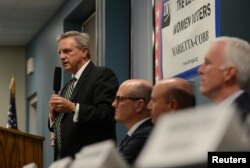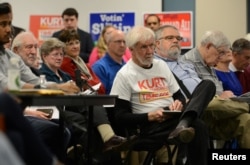Democratic voters still hurting from Hillary Clinton's 2016 loss are hoping that an upcoming special election deep in Atlanta’s suburbs will send a message of disapproval to President Donald Trump.
Almost 100 days into Trump's presidency, voters in Georgia's historically Republican 6th Congressional district will choose a lawmaker to fill the seat opened by the departure of Tom Price, who is now Trump's Health and Human Services secretary.
But with the president's approval ratings hovering around 40 percent, Democrats are hoping that a win in these wealthy suburbs will show that Trump's unpopularity is dragging down other Republican politicians.
Jon Ossoff, the leading Democratic contender, has harnessed the activists' anger with early fundraising appeals like "Make Trump Furious." The 30-year-old, first-time candidate has performed well in polls and raised $8.3 million.
“We’ve got progressive people very angry and worried about Trump’s policies and this is the only race that’s on the national stage,” said Jen Cox, a Georgia 6th District voter who recently started activist group PaveItBlue to support Ossoff.
Cox said the election's national stakes have energized many Democrats in the district. More than than 1,000 people joined her group within the first month, she said.
The suburbs of the 6th Congressional District have experienced enormous growth in the past 20 years while remaining staunchly Republican. Voters here have not sent a Democrat to Congress since 1979.
But district voters did not cast their ballots in large numbers for Trump and his populist agenda in the 2016 presidential election, handing him just a 1.5 percent win over Democrat Hillary Clinton. By comparison, moderate Republican Mitt Romney won the district by a 22-point margin in the 2012 presidential race.
“We have Republicans that come over to us and say we want to help you flip the 6th,” Cox said.
However, some observers said focusing on Trump obscures the district's true makeup.
“For Jon Ossoff to win is for a district to behave unlike what it is at its core of being,” said Todd Rehm, a Republican strategist who runs the blog GeorgiaPundit.com. “This is a Republican district, not a 50/50 district.”
Watch: Early Test of Trump Presidency in Georgia Congressional Election
Ossoff told VOA Georgia 6th voters are more concerned about the economy than ideology.
“There are certainly folks here in the community who are concerned that the White House might not be competent, that there is dishonesty, that the president may embarrass us on the world stage,” he said. “I share those concerns, but this campaign is about a positive vision for our community and the country.”
Ossoff will need to sway moderate Republicans to his side to emerge from a field of 18-candidates as the outright winner of the April 18th runoff election. The candidates have each sliced off a small percentage of the vote, making it difficult for Ossoff, who polls at around 40 percent, to attain a majority.
If no candidate secures a 50 percent majority, the top two will go on to a June election in which a Republican candidate will be heavily favored.
The president hasn't personally supported any of the 11 Republican candidates, but many claim to be the true Trump candidate.
“The fact that the Democratic Party is trying to make this a referendum on Trump is bringing out even more folks, GOP base and those that didn’t vote, so turnout is going to be extraordinary in this election,” Republican candidate Bob Gray told VOA.
Gray's campaign aims to activate passionate Trump voters; an approach that has propelled him to the top of the Republican field alongside veteran Georgia politician Karen Handel, who appeals to more moderate voters. He believes the president’s first 100 days aren't the liability seen by Democratic activists.
“When President Trump gave his speech to a Joint Session of Congress, the entire country saw him grow into the role of the president that night,” Gray said.
Fellow candidate Bruce LeVell, who headed Trump’s national diversity coalition, would like to be known as the district’s closest connection with the president.
“It’s only 100 days, in which we’ve done a tremendous amount, so I think the 6th could gain a lot from a person like myself as a Congressman who has that great relationship,” LeVell told VOA.
When it comes to President Trump, all conventional political wisdom is set aside. Looking at Trump’s impact on the Georgia 6th race, Todd Rehm said, “It’s like a magnetic field, it can both attract and repel.”









